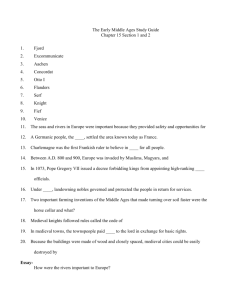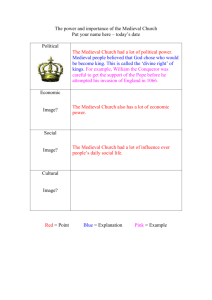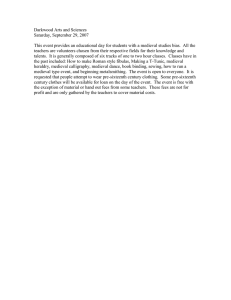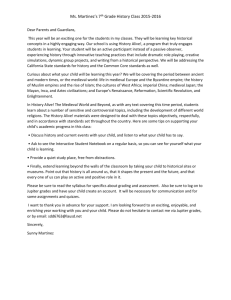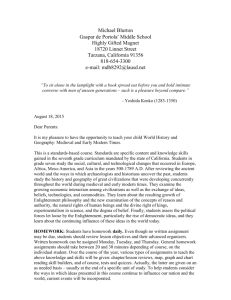cla404_sanctity_s11.docx
advertisement
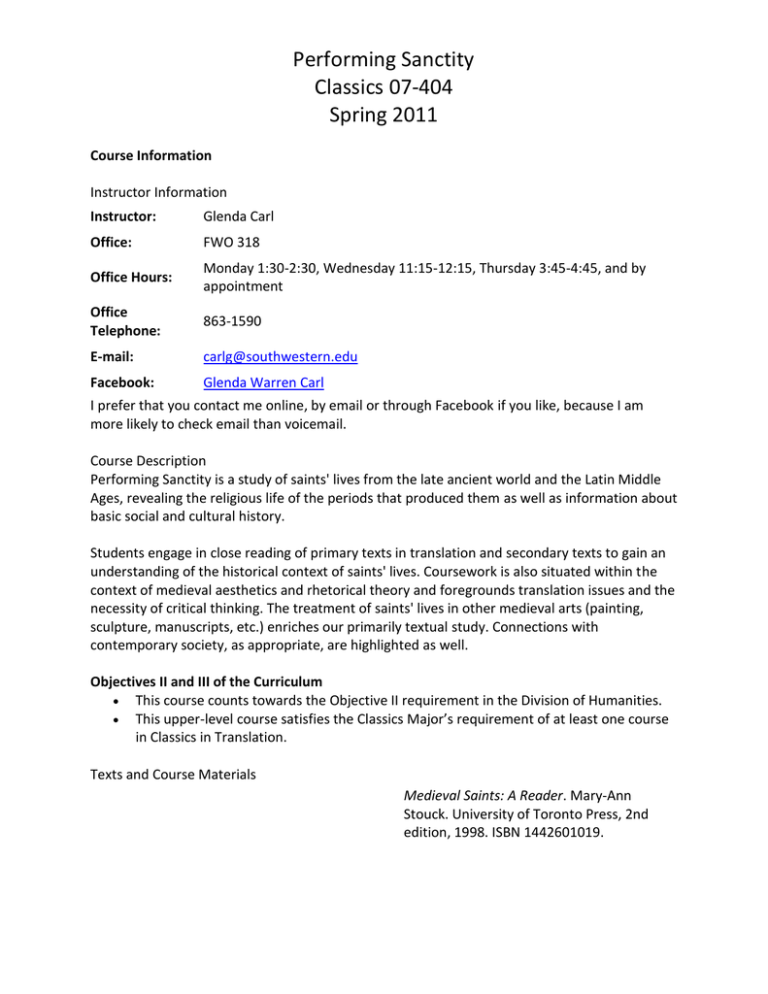
Performing Sanctity Classics 07-404 Spring 2011 Course Information Instructor Information Instructor: Glenda Carl Office: FWO 318 Office Hours: Monday 1:30-2:30, Wednesday 11:15-12:15, Thursday 3:45-4:45, and by appointment Office Telephone: 863-1590 E-mail: carlg@southwestern.edu Facebook: Glenda Warren Carl I prefer that you contact me online, by email or through Facebook if you like, because I am more likely to check email than voicemail. Course Description Performing Sanctity is a study of saints' lives from the late ancient world and the Latin Middle Ages, revealing the religious life of the periods that produced them as well as information about basic social and cultural history. Students engage in close reading of primary texts in translation and secondary texts to gain an understanding of the historical context of saints' lives. Coursework is also situated within the context of medieval aesthetics and rhetorical theory and foregrounds translation issues and the necessity of critical thinking. The treatment of saints' lives in other medieval arts (painting, sculpture, manuscripts, etc.) enriches our primarily textual study. Connections with contemporary society, as appropriate, are highlighted as well. Objectives II and III of the Curriculum This course counts towards the Objective II requirement in the Division of Humanities. This upper-level course satisfies the Classics Major’s requirement of at least one course in Classics in Translation. Texts and Course Materials Medieval Saints: A Reader. Mary-Ann Stouck. University of Toronto Press, 2nd edition, 1998. ISBN 1442601019. Selected online readings from sources such as: The On-line Reference Book for The ORB is an academic site, written and Medieval Studies maintained by medieval scholars for the benefit of their fellow instructors and serious students. All articles have been judged by at least two peer reviewers. Authors are held to high standards of accuracy, currency, and relevance to the field of medieval studies. ORB'S OCLC number is 35987956. The Internet Medieval Sourcebook This project's goals has been to construct an archive of source texts from available public domain and copy-permitted texts. It is both very large and fairly old in Internet terms. An effort is underway to remove bad links, but some may have escaped. Course Structure This course is based on a synergistic combination of lecture, discussion, and activity. Students will complete course readings outside of class. Classes will typically begin with a short lecture followed by discussion. To facilitate discussion and a deeper engagement with the readings, students will complete a variety of assignments such as reaction papers, online discussions, oral reports, illustrations, imitations, dramatizations, narratives, and so on. The class meets for 75 minutes twice a week. Students should expect to devote at least two hours to preparation for each class Learning Outcomes At the end of this course, students will be able to: demonstrate an appreciation for the significance of Christian saints' lives for medieval society compare and contrast representations of saints in medieval cultures, in the earliest accounts, and in contemporary cultures. synthesize historical, medieval, and contemporary usage of hagiographical material in a final project Grading Policy Graded Course Activities Students will be evaluated based on attendance and participation in class discussions, a variety of short assignments based on readings and discussions, a synthetic activity after the completion of each assigned text (it will be similar in content and structure to the shorter assignments but more substantial), and a final research project. Final grades will be determined as follows: Percentage Description 20% Attendance and participation in class discussions 20% A variety of assignments, such as reaction papers, online discussions, oral reports, illustrations, imitations, dramatizations, narratives, etc. 30% Three synthetic activities, similar in type to the shorter assignments but more substantial 30% Final research project 100% Total Each participation grade will be on a three-point scale: three points if you are present and volunteer; two if you respond when called on; one if you are present but silent; and no points if you are absent. Seniors will make their final project presentation during the week of April 25 so that I may turn their final grades in by May 2. Due dates for the final draft and its return may be adjusted for seniors according to the pressures of individual schedules. Viewing Grades in Moodle Moodle has a Grades section where you can track your progress in this course. Please be patient with me as I figure out the fine points of using Moodle's grading system, since I am used to another one. And PLEASE never hesitate to let me know if your records differ from mine! Letter Grade Assignment The plus and minus grading system will be used for final grades. Semester percent averages will translate to the following letter grades: Letter Grade Percentage GPA Performance A+ 97-100% 4.00 Extraordinary Work A 93-96% 4.00 Excellent Work A- 90-92% 3.67 Nearly Excellent Work B+ 87-89% 3.33 Very Good Work B 83-86% 3.00 Good Work B- 80-82% 2.67 Mostly Good Work C+ 77-79% 2.33 Above Average Work C 73-76% 2.00 Average Work C- 70-72% 1.67 Mostly Average Work D+ 67-69% 1.33 Below Average Work D 63-66% 1.00 Poor Work D- 60-62% 0.67 Extremely Poor Work F 0-59% 0.00 Failing Work Grades may be appealed based on the instructor’s alleged failure to weight the elements of the final grade as described in the syllabus, on the alleged prejudicial treatment of individual students, or on an alleged violation of the Academic Rights for Students as stated in the Student Handbook and the Faculty Handbook. If you should wish to appeal your semester grade, follow the procedures outlined in the Student Handbook. Important note: For more information about grading at Southwestern, visit the Academic Policies and Procedures section of the university catalog. Course Policies Attend Class As stated in the Catalog and the Student Handbook, class attendance is required at Southwestern University. Please be aware that excessive absences (five or more) may lead to involuntary withdrawal from a course. I allow three unexcused absences in this course; each absence after that will drop your final course grade by 2%. Only absences for participation in University-sponsored activities, such as intercollegiate athletics, class-related field trips, or ensemble tours are considered excused absences by the University. You should confirm with the staff or faculty member sponsoring the event to be sure that your professors are notified of your absence. In the case of cultural or religious observances, or graduate school or internship interviews, I will excuse the absence, provided that: At least one week prior to the event, or on the first day of class if the event takes place during the first week of class, you notify me of the class(es) to be missed and You negotiate with me alternate times to complete any assignments or exams that will be due on the date(s) of the missed class(es). Be prepared to complete this work prior to the class(es) to be missed. It is your responsibility to notify the professor by phone or email when you will be absent from class, including when you are sick or not feeling well enough to attend class. Notification on the day of the absence (preferably before class) is a requirement for negotiating an excused absence in the case of illness. Participate Regular attendance and active participation in class activities are essential to your success in this course. I evaluate attendance and participation on a three-point scale. Presence and voluntary participation in class earn three points per class session; presence and participation in response to my direct questions earn two points per session; presence accompanied by silence earns one point; and absence from class earns a zero for that day’s participation grade. Build Rapport Respect your classmates by participating responsibly in any group work, by showing courtesy in class discussions, and by regulating completely random digressions from the topic being discussed. I assume that you have a working set of study skills, that you will come to class prepared, that you will feel free to ask me any course-related questions and seek help whenever something is unclear, and that you will give me constructive feedback. If you find that you have any trouble keeping up with assignments or with other aspects of the course, make sure that you let me know as early as possible so that I can help you find a solution. Complete Assignments Assignments must be submitted by the given deadline or special permission must be requested from instructor before the due date. Extensions will not be given beyond the next assignment except under extreme circumstances. Understand Withdrawals and Incompletes Involuntary Withdrawal Process When, prior to the last day to drop courses (after the 10th week of class), excessive absences, as defined by the professor in the course syllabus and the University Excused Absence Policy, jeopardize a student's work in this course, the professor may request that the Registrar drop the student from the course. After the last day to drop, students missing an excessive number of class meetings could be dropped at the discretion of the professor with an "F." Students will be notified of this action by the Center for Academic Success. Incomplete Policy The grade of Incomplete shall given only in the case of medical emergency or some other emergency situation beyond the student's control. The grade of Incomplete may not be given for the sole reason of permitting additional time to complete assigned course work. If the Incomplete has not been replaced by 5 p.m. on the last day to add courses of the next regular semester, the grade becomes an F. Upon petition in writing by the student and approval by the faculty member, extension of the deadline may be granted by the Registrar. Inform Your Instructor of Any Accommodations Needed Southwestern University will make reasonable accommodations for students with documented disabilities. To arrange accommodations students should contact the Assistant Director for Academic and Access Resources within the Center for Academic Success (Prothro Center for Lifelong Learning, 1st floor; phone 863-1286; email carterk@southwestern.edu) at least two weeks before services are needed. It is the student’s responsibility to discuss any necessary accommodations with the appropriate faculty member. Please see me by the end of the second week of classes. Commit to Integrity Dating back to 1907, the Southwestern University Honor Code is a long-held tradition with our students and faculty. At the Matriculation Convocation, new students affirm their participation in and support of the Honor Code system. Issues such as cheating or plagiarism (submitting someone else's work as your own) are serious. Do your own work. Read the description of our honor system in the Student Handbook. The pledge runs, as you remember, "I have acted with honesty and integrity in producing this work and am unaware of anyone who has not." Write out the pledge in full (not PIF) and sign it at the end of all written assignments. Important Note: Any form of academic dishonesty must be reported to the Honor Code Council or the Dean of Students. This syllabus, assignments, and due dates are subject to change. It is the student's responsibility to check Moodle for corrections or updates to the syllabus. Any changes will be posted on Moodle. Have Fun! Medieval and literature leads us into a surreal world with which we imagine ourselves to be acquainted through childhood tales, Hollywood films, and received ideas. The culture of the Catholic Church, which may be both familiar and strangely different to some of us, reaches into every corner of life in this world, yet ancient lore and inquiring minds continually break through the veneer. Enjoy the trip! “Only the learning that is enjoyed will be learned well” (Judah haNasi). Weekly Schedule January 11 Course introduction January 13 Outside the Institution (establishment, power structure, official religion, sociocultural norm) The first Christian saints were martyrs, because the new religion was seen as a threat to the Roman Empire. January 18 SS Perpetua and Felicity Read The Passion of SS Perpetua and Felicity in the Internet Medieval Sourcebook. Ryan and Laura, you can find the Passio Sanctarum Perpetuae et Felicitatis in The Latin Library, if you like. For (non-neutral) background, read Sts. Felicitas and Perpetua in the New Advent Catholic Encyclopedia. January 20 Read some background information about Polycarp and the Martyrdom of Polycarp. January 25 Medieval Saints: A Reader Read Ch. 1, Martyrs of the Early Church In class, we'll discuss St. Cyprian, the Seven Sleepers of Ephesus, and the martyrs of Vienne and Lyons. January 27 Medieval Saints: A Reader Read Ch. 2, The Desert Fathers and Mothers In class, we'll discuss St. Antony of Egypt. February 1 We'll discuss the two Pauls in Ch. 2. February 3 We'll discuss the two Marys and Macrina. February 8 Finishing up Ch. 2, we'll discuss Symeon Stylites and prepare for the first synthetic activity on Thursday. February 10 Write and illustrate your own story of a (real or imaginary) martyr. February 15 and following tba
